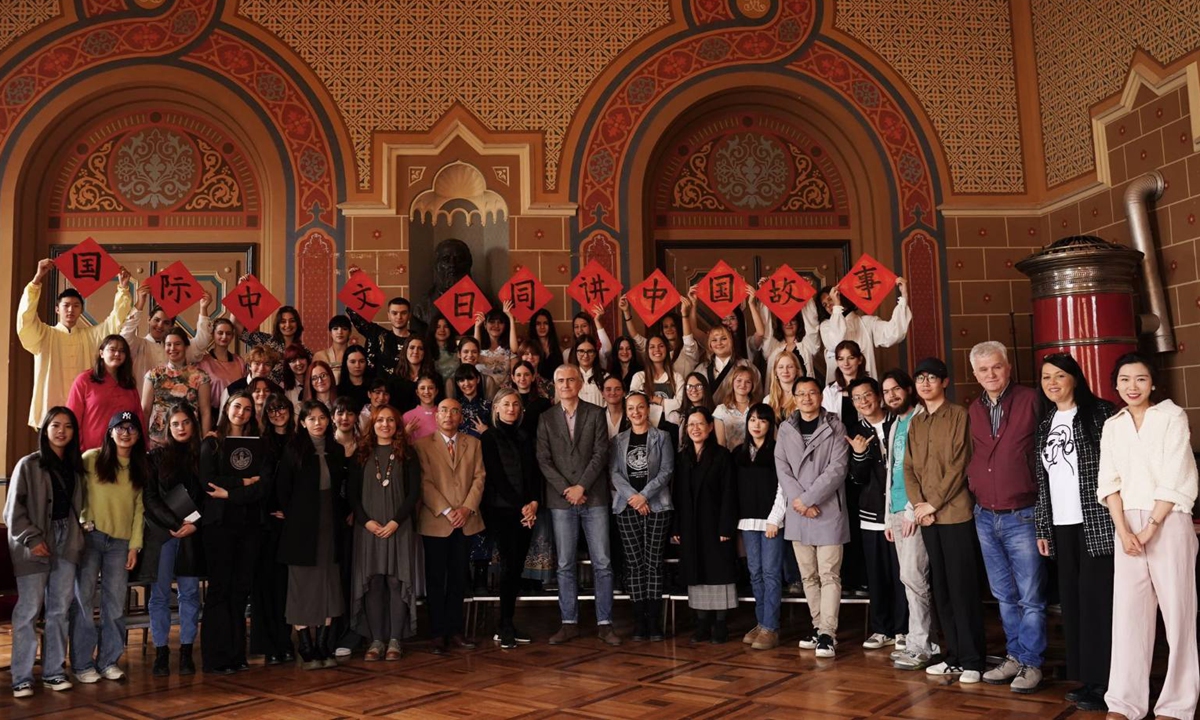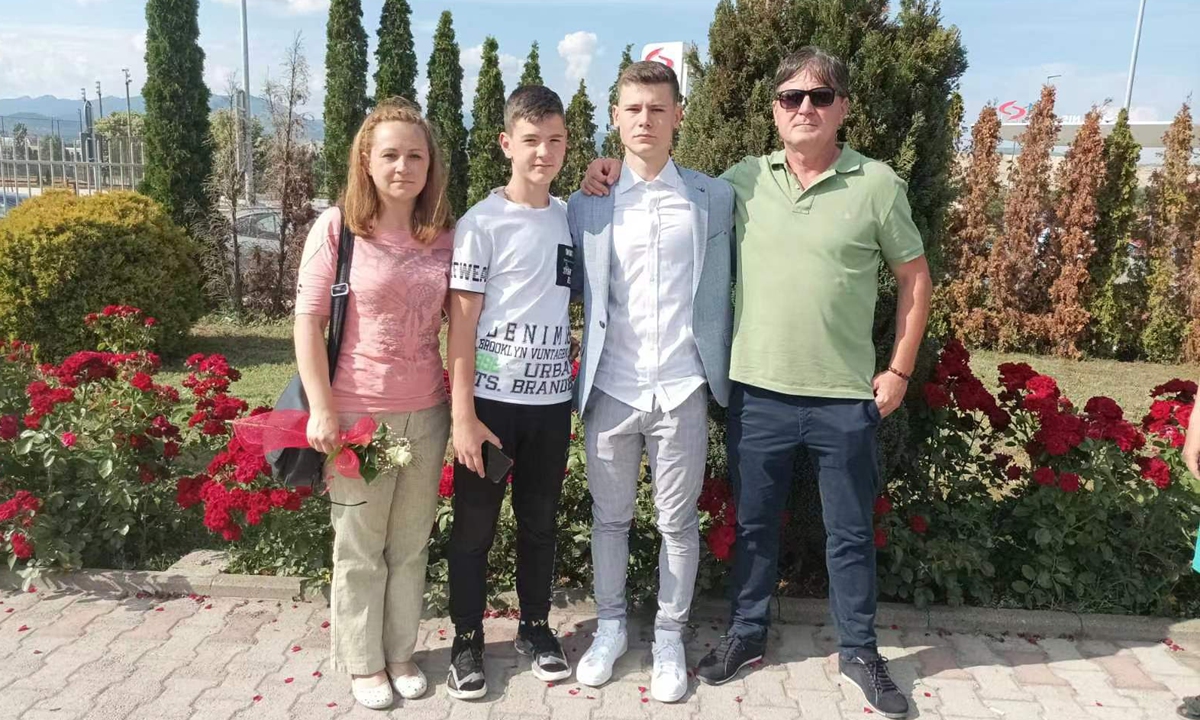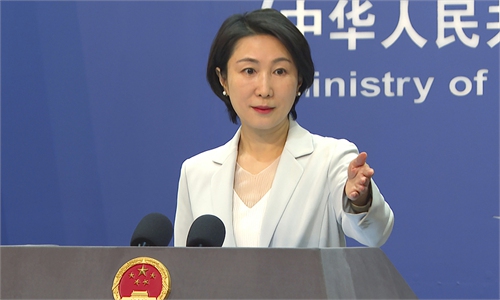Foreign employees in Chinese companies share life-altering transformations brought by initiative
Touching stories along the Belt and Road
Editor's Note:
Eyeing common prosperity for all human beings, the BRI helps foster new engines for economic development and people-to-people exchanges. For local people in Central and Eastern Europe, the BRI may sound like too big an idea, but every story of their engagement shows the whole picture of this grand project. Global Times reporters chose the stories of three locals, which show the human side of the BRI.

'Honored to be part of railway project'
Amid the roar of machinery and the ceaseless joint efforts of workers from China and Hungary, the Hungarian section of the grand Hungary-Serbia railway project is progressing in an organized manner.
Behind this undertaking, few comprehend the challenges and fruition as intimately as Bartha György János, deputy director of the office of China Railway Electrification Engineering Group (Hungary), a subsidiary of China Railway Group Ltd.
He embarked on his career journey with the Hungary-Serbia railway project in January 2020, serving as a translator and interpreter - a choice he cherishes with unwavering pride.
"The completion of this project will significantly bolster Hungary's railway transportation capacity in the Central and Eastern European region, fostering cooperation and mutual benefit between China and Hungary. I am privileged to contribute to the development of this project," Bartha said.
His work is far from easy. Translation demands a combination of specialized knowledge, linguistic proficiency and cultural acumen to ensure precise communication. Pivotal challenges encompass the translation of railway-specific terminology, engineering specifications, design blueprints and the jargon of the electrical field. A meticulous grasp of these technical intricacies is imperative to guarantee the project's seamless execution. For Bartha, this journey represents a continuous process of learning and growth.
"I was fully engaged in the process of obtaining the DeBo certificate for the wheel gauge system. When I finally grasped the certificate following rigorous QMS and design reviews, I deeply sensed that all the previous efforts had been worthwhile," he reflected. Designated Body, short for DeBo, is an independent assessment body acknowledged for its competences. The DeBo assesses and verifies the compliance of all phases (design, manufacturing, operation and maintenance) in accordance with national rules in force.
Throughout the construction and subsequent maintenance phases of the Hungary-Serbia railway project, many local engineers, technical professionals and machinery operators have found employment, thereby creating numerous job opportunities for the local people and enhancing their quality of life.
As the project expands, Bartha now oversees a five-person translation team.
From Bartha's perspective, China stands as a global leader in high-speed rail, and the integration of China's advanced technology and methodologies into the Hungary-Serbia project significantly augments the efficiency of railway construction.
More importantly, as a landmark collaborative task between China and Central and Eastern European nations, the project has the potential to transform Hungary into a regional logistics hub, offering a range of opportunities, Bartha told the Global Times.
"From a broader perspective, international cooperation projects present a splendid avenue for mutual learning, encompassing railway technology, techniques, cultural exchanges and more. Each participant stands to benefit and grow, and I am honored to be counted as one of them," said Bartha.

'I learn Chinese because it has prospects'
Luka Simic believes that time flies, as in just one week, the 17-year-old Serbian boy will return to China as an exchange student at the Zhejiang Agricultural and Forestry University.
"It is very different from here in Serbian cities," he told the Global Times, about his recent summer camp tour to Beijing in July, which was also his first visit to China - a country whose language he had studied for years.
"Big, crowded... It is like a new universe for us. But people in China are very kind to us and treat us like friends even if they don't know us," said Luka.
Luka started studying Chinese on entering high school four years ago, thanks to the Confucius Institute at the University of Novi Sad in Serbia.
The classes are not just about language but also involve events that students like Luka can host and take part in. He recalled that they had a lot of fun when making dumplings and preparing hotpot. "We have absolutely best teachers who are very patient, who deepened my love for the Chinese language even more."
He decided to take Chinese as his major since he wanted to study a language "that's spoken by many people, with a long history and tradition," as well as a language "that has prospects," so "choosing the Chinese language was kind of a natural choice."
Besides, "Serbia and China are very friendly countries toward each other, and we Chinese language students are one of the bridges to further deepen that friendship," he added.
When walking the streets of Beijing, Luka and his friends were surprised to find that "many Chinese people knew about Serbia and our friendship."
For Serbian young people like Luka, it is amazing that they can meet new people and make friends on WeChat as part of the summer camp. According to the Confucius Institute in Serbia, local young people have shown a strong interest in Chinese people and Chinese culture.
"They hope to learn China and what changes and achievements that China has made," Chen Xiu, Chinese director of the Confucius Institute at the University of Novi Sad, told the Global Times. "Besides, more and more Chinese companies have expanded their business and investment in Serbia, which generates a strong need for local bilingual talent."
For Luka, his plan is to "study law and Chinese in Serbia." After that, his dream is to "go on to master's studies at Fudan University in Shanghai."
The traditional friendship between China and Serbia as well as the BRI have brought Serbian young people many opportunities to study in China. "The Serbian government is supporting us to go and study in China. It's very important to us and gives us confidence for the future development of the two countries as well as ourselves," he said.

'Chinese company gives me secure happiness'
For Kolega Vidoje Adamovic, the entry of Chinese company Zijin Mining Group into Serbia was a lucky moment. It not only put his life but also the lives of other residents in Bor in eastern Serbia back on the right track.
Adamovic has been working in local copper mines for 27 years. He said that the 1980s was the golden era of the mines in Bor. At one point, people from more than 20 countries worked there.
The Bor cooper mines have undergone ups and downs. The break-up of Yugoslavia and the Kosovo War in 1999 led to the decline of the mines. The parts and accessories for many types of equipment could not be imported due to the sanctions against Yugoslavia.
In 1999, two NATO missiles hit a power station at the mining complex, injuring six workers and wreaking considerable damage. Factories went dark without electricity. Staff members had no choice but to return to where they had come from - either rural areas or another country, and they could barely sustain themselves.
Adamovic also lived a hard life at that time. His income was not enough to feed the whole family. With no car or house of his own, he had to receive help from his parents. Things began to change for the better after some foreign capital entered the Bor mines, but a life-changing event took place only when Zijin invested in the mines in 2018. He could afford a new car, save money and even plan for holidays. The lives and education of his children could be secured. In the words of Adamovic, the Chinese company provided him "secure happiness."
Coincidentally, his elder son now studies mining at the same college as Adamovic did. Adamovic said it won't be long before the father and son work for the same company at the same place.
Adamovic said that although they are different culturally, the Chinese and Serbian staff members are getting closer through long-term work and communications. Serbian people invite their Chinese colleagues to their homes to celebrate local festivals, where they get to know each other's cuisine and dietary customs.
Adamovic said that there is no drinking tradition of "bottom up" in Serbia, but now they have learned this Chinese ritual.
"We have been debating whose drinking capacity is better, the Serbians or the Chinese? Each time we drink together, it's a competition!" said Adamovic.
Eyeing common prosperity for all human beings, the BRI helps foster new engines for economic development and people-to-people exchanges. For local people in Central and Eastern Europe, the BRI may sound like too big an idea, but every story of their engagement shows the whole picture of this grand project. Global Times reporters chose the stories of three locals, which show the human side of the BRI.

Bartha Gyorgy János and his wife Photo: Courtesy of Bartha
'Honored to be part of railway project'
Amid the roar of machinery and the ceaseless joint efforts of workers from China and Hungary, the Hungarian section of the grand Hungary-Serbia railway project is progressing in an organized manner.
Behind this undertaking, few comprehend the challenges and fruition as intimately as Bartha György János, deputy director of the office of China Railway Electrification Engineering Group (Hungary), a subsidiary of China Railway Group Ltd.
He embarked on his career journey with the Hungary-Serbia railway project in January 2020, serving as a translator and interpreter - a choice he cherishes with unwavering pride.
"The completion of this project will significantly bolster Hungary's railway transportation capacity in the Central and Eastern European region, fostering cooperation and mutual benefit between China and Hungary. I am privileged to contribute to the development of this project," Bartha said.
His work is far from easy. Translation demands a combination of specialized knowledge, linguistic proficiency and cultural acumen to ensure precise communication. Pivotal challenges encompass the translation of railway-specific terminology, engineering specifications, design blueprints and the jargon of the electrical field. A meticulous grasp of these technical intricacies is imperative to guarantee the project's seamless execution. For Bartha, this journey represents a continuous process of learning and growth.
"I was fully engaged in the process of obtaining the DeBo certificate for the wheel gauge system. When I finally grasped the certificate following rigorous QMS and design reviews, I deeply sensed that all the previous efforts had been worthwhile," he reflected. Designated Body, short for DeBo, is an independent assessment body acknowledged for its competences. The DeBo assesses and verifies the compliance of all phases (design, manufacturing, operation and maintenance) in accordance with national rules in force.
Throughout the construction and subsequent maintenance phases of the Hungary-Serbia railway project, many local engineers, technical professionals and machinery operators have found employment, thereby creating numerous job opportunities for the local people and enhancing their quality of life.
As the project expands, Bartha now oversees a five-person translation team.
From Bartha's perspective, China stands as a global leader in high-speed rail, and the integration of China's advanced technology and methodologies into the Hungary-Serbia project significantly augments the efficiency of railway construction.
More importantly, as a landmark collaborative task between China and Central and Eastern European nations, the project has the potential to transform Hungary into a regional logistics hub, offering a range of opportunities, Bartha told the Global Times.
"From a broader perspective, international cooperation projects present a splendid avenue for mutual learning, encompassing railway technology, techniques, cultural exchanges and more. Each participant stands to benefit and grow, and I am honored to be counted as one of them," said Bartha.

Luka Simic (sixth from left, back row) attends an event to mark the Chinese Language Day. Photo: Courtesy of Luka
'I learn Chinese because it has prospects'
Luka Simic believes that time flies, as in just one week, the 17-year-old Serbian boy will return to China as an exchange student at the Zhejiang Agricultural and Forestry University.
"It is very different from here in Serbian cities," he told the Global Times, about his recent summer camp tour to Beijing in July, which was also his first visit to China - a country whose language he had studied for years.
"Big, crowded... It is like a new universe for us. But people in China are very kind to us and treat us like friends even if they don't know us," said Luka.
Luka started studying Chinese on entering high school four years ago, thanks to the Confucius Institute at the University of Novi Sad in Serbia.
The classes are not just about language but also involve events that students like Luka can host and take part in. He recalled that they had a lot of fun when making dumplings and preparing hotpot. "We have absolutely best teachers who are very patient, who deepened my love for the Chinese language even more."
He decided to take Chinese as his major since he wanted to study a language "that's spoken by many people, with a long history and tradition," as well as a language "that has prospects," so "choosing the Chinese language was kind of a natural choice."
Besides, "Serbia and China are very friendly countries toward each other, and we Chinese language students are one of the bridges to further deepen that friendship," he added.
When walking the streets of Beijing, Luka and his friends were surprised to find that "many Chinese people knew about Serbia and our friendship."
For Serbian young people like Luka, it is amazing that they can meet new people and make friends on WeChat as part of the summer camp. According to the Confucius Institute in Serbia, local young people have shown a strong interest in Chinese people and Chinese culture.
"They hope to learn China and what changes and achievements that China has made," Chen Xiu, Chinese director of the Confucius Institute at the University of Novi Sad, told the Global Times. "Besides, more and more Chinese companies have expanded their business and investment in Serbia, which generates a strong need for local bilingual talent."
For Luka, his plan is to "study law and Chinese in Serbia." After that, his dream is to "go on to master's studies at Fudan University in Shanghai."
The traditional friendship between China and Serbia as well as the BRI have brought Serbian young people many opportunities to study in China. "The Serbian government is supporting us to go and study in China. It's very important to us and gives us confidence for the future development of the two countries as well as ourselves," he said.

Kolega Vidoje Adamovic (right) and his family Photo: Courtesy of Adamovic
'Chinese company gives me secure happiness'
For Kolega Vidoje Adamovic, the entry of Chinese company Zijin Mining Group into Serbia was a lucky moment. It not only put his life but also the lives of other residents in Bor in eastern Serbia back on the right track.
Adamovic has been working in local copper mines for 27 years. He said that the 1980s was the golden era of the mines in Bor. At one point, people from more than 20 countries worked there.
The Bor cooper mines have undergone ups and downs. The break-up of Yugoslavia and the Kosovo War in 1999 led to the decline of the mines. The parts and accessories for many types of equipment could not be imported due to the sanctions against Yugoslavia.
In 1999, two NATO missiles hit a power station at the mining complex, injuring six workers and wreaking considerable damage. Factories went dark without electricity. Staff members had no choice but to return to where they had come from - either rural areas or another country, and they could barely sustain themselves.
Adamovic also lived a hard life at that time. His income was not enough to feed the whole family. With no car or house of his own, he had to receive help from his parents. Things began to change for the better after some foreign capital entered the Bor mines, but a life-changing event took place only when Zijin invested in the mines in 2018. He could afford a new car, save money and even plan for holidays. The lives and education of his children could be secured. In the words of Adamovic, the Chinese company provided him "secure happiness."
Coincidentally, his elder son now studies mining at the same college as Adamovic did. Adamovic said it won't be long before the father and son work for the same company at the same place.
Adamovic said that although they are different culturally, the Chinese and Serbian staff members are getting closer through long-term work and communications. Serbian people invite their Chinese colleagues to their homes to celebrate local festivals, where they get to know each other's cuisine and dietary customs.
Adamovic said that there is no drinking tradition of "bottom up" in Serbia, but now they have learned this Chinese ritual.
"We have been debating whose drinking capacity is better, the Serbians or the Chinese? Each time we drink together, it's a competition!" said Adamovic.



